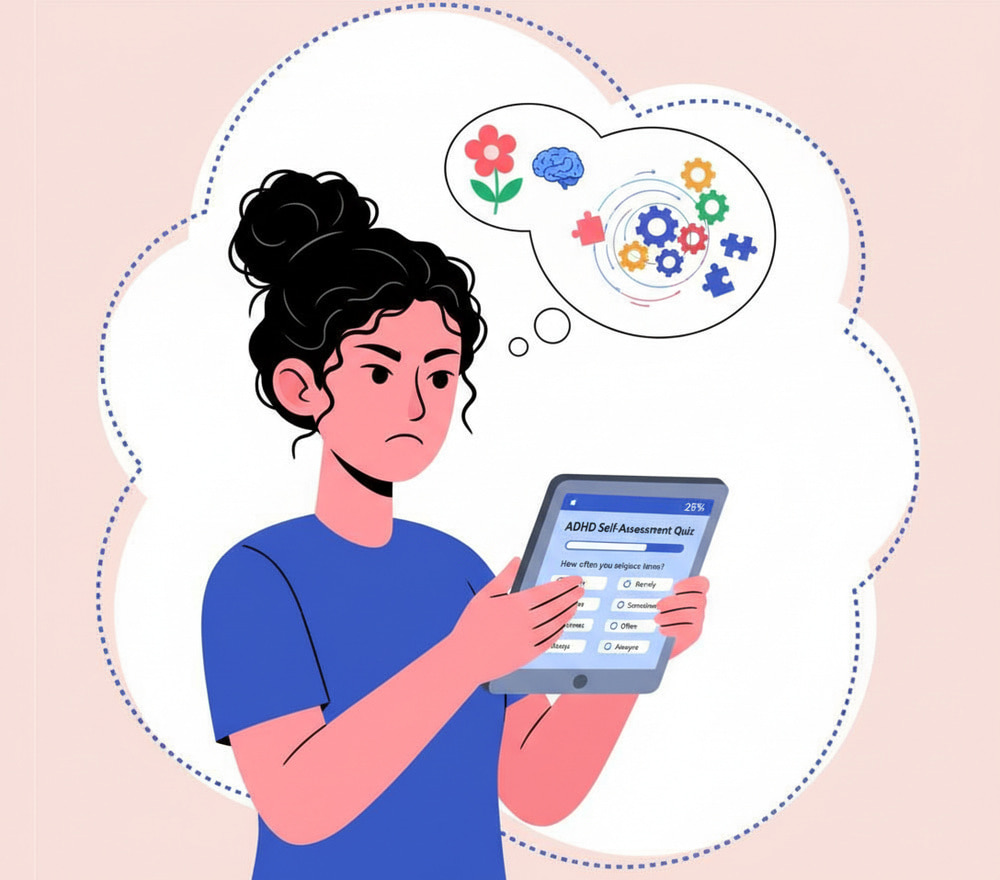Understanding Adult ADHD Screeners: A Comprehensive Guide to Smarter Self-Assessment

Take ADHD Quiz Online
Get StartedWhat Screening Tools Do and Why They Matter for Grown-Ups
For many adults, questions about attention, memory, and impulsivity surface after years of coping, compensating, and feeling out of step. A modern self-assessment can be a compassionate starting point, translating vague frustrations into observable patterns. Rather than diagnosing, these instruments highlight tendencies that are consistent with attention-related conditions and help you decide whether to pursue a professional evaluation. Used thoughtfully, they reduce guesswork, demystify terminology, and give language to experiences that once felt indescribable.
Many readers begin with the ADHD quiz for adults as a quick self-check that can spotlight patterns they have shrugged off for years. These screeners typically ask about focus, time management, task initiation, follow-through, forgetfulness, and restlessness, drawing on symptoms observed across different settings. Because adult lives are complex, the most helpful tools present questions that apply to both work and home, while also accounting for variability across days and environments.
Others prefer a structured path, so a reputable adult ADHD quiz can function as a map for what to discuss with a clinician. Think of the output as a conversation starter: it can reveal trends, severity bands, and functional impact that you might otherwise overlook. You can bring results to appointments, compare them with partner or coworker observations, and track change as you experiment with new habits. Over time, that data-driven mindset empowers clearer decisions about care, accommodations, and lifestyle support.
- Clarify patterns you can’t easily articulate in the moment
- Track changes as routines, sleep, or stressors shift
- Prepare for efficient, focused clinical conversations
- Reduce stigma by translating experiences into neutral language
Benefits, Limits, and How to Interpret Your Results
Self-assessments are best framed as signposts, not verdicts. A high score suggests that your daily life aligns with known attention-related challenges, while a low score does not guarantee smooth sailing. Context matters: trauma, anxiety, depression, thyroid issues, and sleep disorders can mimic or magnify similar symptoms. Interpreting your output through that broader lens keeps you from overfitting a single explanation to a complex picture.
With that context, a concise ADHD quiz adult becomes less about labels and more about noticing daily friction points. You might realize that task-switching shreds your focus, that you consistently underestimate time, or that boredom triggers impulsive decisions. Those insights lend themselves to practical experiments, like time-blocking with buffers, externalizing tasks into visual systems, or introducing novelty to sustain engagement in long projects.
People often frame it as a yes-or-no decision, yet the phrase do i have adult ADHD quiz actually refers to a screener that estimates likelihood rather than certainty. That distinction guards against both false confidence and unnecessary alarm. Instead of fixating on a single number, review item clusters and note where challenges concentrate: organization, working memory, distractibility, or impulsivity each invite different next steps and coping strategies tailored to real-world demands.
When designed well, an evidence-informed ADHD symptoms adults quiz highlights inattentive and hyperactive tendencies across situations, not just at work. Balanced instruments also ask about onset and persistence, because developmental timing is central to clinical frameworks. Taken together, these elements make your results more actionable, especially when you layer them with observations from people who know you in different contexts.
| What You Get | Why It Matters | What To Do Next |
|---|---|---|
| Symptom pattern snapshot | Turns vague frustration into specific targets | List the top 3 friction points to address this month |
| Severity band or score | Helps gauge how disruptive patterns feel day to day | Share results with a healthcare professional for context |
| Contextual prompts | Separates workplace strain from home-life dynamics | Adjust routines and supports where the strain is highest |
| Educational guidance | Reduces stigma and clarifies terminology | Use reputable resources to plan skills training and habits |
- Remember that screeners are starting points, not diagnoses
- Compare results over time to understand trends
- Look for patterns across multiple environments
- Bring a concise written summary to any appointment
How to Take a Self-Assessment Effectively and Avoid Bias
Great input produces useful output, so a few habits will sharpen your results. Take assessments when you are rested, not in the middle of a crisis or after an all-nighter. Reflect on the last six months rather than only yesterday, and think across settings: solo work, meetings, home routines, and social situations. When possible, ask a trusted person to read the items and describe how they see you in similar scenarios; an outside perspective can surface blind spots you’ve normalized.
If you face gender-specific hurdles, a tailored ADHD quiz for adult women may validate masked traits such as internalized restlessness or perfectionism. Many women report camouflaging forgetfulness with elaborate planning systems or overpreparing to compensate for distractibility. Instruments that acknowledge hormonal shifts, masking, and societal expectations can produce a more accurate snapshot, especially when combined with journaling around work cycles, sleep changes, and emotional load.
Budget-conscious readers appreciate that a credible ADHD quiz for adults for free can still provide directional insight before any appointment is booked. Even without paywalls, you can seek tools that cite research, explain scoring, and include disclaimers about limitations. As you compare options, prioritize clarity of questions, neutral wording, and practical guidance at the end of the assessment so you know exactly how to apply what you learned this week.
- Choose a calm time and space to complete the assessment
- Use recent, representative examples from multiple contexts
- Invite a partner or friend to compare notes respectfully
- Revisit results after sleep, nutrition, or routine changes
Next Steps After Your Score: From Insight to Action
Once you have results, the goal is to convert awareness into momentum. Begin with one or two friction points and prototype small changes: calendar alarms with visual cues, written checklists for task sequences, or a five-minute activation ritual to defeat inertia. Anchor new strategies to existing habits, and schedule brief weekly reviews to track what helps. Treat the process as iterative and compassionate; experimentation beats perfectionism every time.
As a first step, a trustworthy ADHD online quiz for adults can reduce friction by offering instant, private scoring on any device. With that baseline, consider a conversation with a primary care provider or specialist who can assess differential diagnoses and comorbidities. If appropriate, you might explore behavioral coaching, skills-based therapy, lifestyle changes, or medical options, guided by both lived experience and professional insight.
For exploratory learning, an interactive ADHD adult quiz can teach terminology while normalizing the idea of seeking help. Pair that learning with practical scaffolds: break projects into visible steps, chunk time with focused sprints, and externalize memory with notes, timers, and whiteboards. These concrete supports often deliver relief quickly, even before any formal evaluation, because they align your environment with how your attention system actually works.
If you want deeper granularity, a validated adult ADHD symptoms quiz can break down inattentive and hyperactive dimensions with subscale feedback. That detail helps you choose targeted strategies: inattentive-heavy profiles benefit from environmental structure and cueing, while hyperactive-impulsive profiles might emphasize movement breaks and impulse barriers. Share this nuance with clinicians to accelerate accurate assessment and collaborative care planning.
- Turn scores into two or three specific habit experiments
- Document wins and setbacks to refine strategies quickly
- Discuss results with a qualified professional for context
- Reassess periodically to measure progress and adjust
FAQ: Clear Answers to Common Questions
Are online screeners the same as a medical diagnosis?
No, they are screening tools that estimate the likelihood of attention-related challenges and guide whether to seek a full evaluation. If you just want a quick gut check, the familiar phrase do i have ADHD quiz for adults usually means a brief screener that flags whether further evaluation seems worthwhile. Use results as a springboard to discuss history, impairment, and alternatives with a clinician.
What if I score high but I’m still unsure what to do next?
Start by identifying the top two areas where your day-to-day functioning suffers, then trial small, reversible changes. When you want a broad snapshot without medical jargon, a straightforward ADHD for adults quiz provides approachable language and plain-English scoring bands. Bring both your results and your week of experiments to a professional for a more nuanced conversation.
Can life stress or poor sleep skew my results?
Yes, acute stressors and sleep debt can inflate symptoms that look like attention issues, so try to complete assessments during a typical week. Repeat the screener after improving rest and routines, and compare patterns rather than fixating on a single score.
How should I talk about my results with family or coworkers?
Keep it practical: explain which tasks or environments are hardest and how small adjustments could help you perform better. Concrete requests like quieter focus blocks, fewer simultaneous demands, or written follow-ups often get more traction than labels alone.
Do these tools help if I’m already in therapy or coaching?
Absolutely, because they provide shared language and measurable checkpoints for progress. Reassessing at regular intervals can reveal whether strategies are working and where to pivot next.
